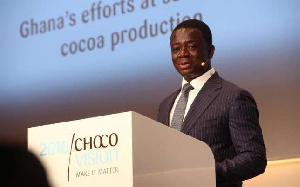- Home - News
- Polls
- Year In Review
- News Archive
- Crime & Punishment
- Politics
- Regional
- Editorial
- Health
- Ghanaians Abroad
- Tabloid
- Africa
- Religion
- Election 2020
- Coronavirus
- Photo Archives
- News Headlines
- Press Release
General News of Saturday, 13 March 2021
Source: mynewsgh.com
GH₵25K transaction was to support Opuni’s needy children - Agongo tells investigators
The principal investigator in the trial of Dr Stephen Opuni and Mr Seidu Agongo, Chief Inspector Thomas Prempeh Mercer on Friday told the court that during police interrogation of Mr Agongo, he stated that the amount of twenty-five thousand Ghana cedis (GH₵25,000.00) which he paid into the bank account of Dr Stephen Opuni in 2014, was in support of some needy children who were in the care of Dr Opuni.
Mr Agongo also repeated the same claim in his official statement to the police; that he recalls paying the money to Dr Opuni to cater for some needy children he cared for at the time.
However, Chief Inspector Mercer said when Dr Opuni was confronted with the reason given by Mr Agongo for the payment, he (Dr Opuni) failed to corroborate Mr Agongo’s claim and instead, told a rather fantastical story of why the money was paid to him.
First, Dr Opuni denied having any needy children in his care nor having an NGO which caters for needy children.
Then, he told investigators that the twenty-five thousand Ghana cedis (GH₵25,000.00) which Mr Agongo paid into his EcoBank account on 10 October 2014 was his own money which he had given to Mr Agongo to pay into his (Dr Opuni’s) EcoBank account?
The prosecution, on the other hand, finds that the payment of the money which occurred some months after Mr Agongo had been given his first of three contracts to supply fertilisers to the Ghana Cocoa Board (COCOBOD), is an act amounting to bribery of a public officer and forms part of a series of actions which were undertaken by Mr Agongo and Dr Opuni, including the instruction to shorten a testing period of fertilizers and agrochemicals and the circumvention of the procurement protocols, which led to the award of contracts to Agricult Ghana Limited from 2014 to 2016
Mr Samuel Cudjoe, the lawyer for Dr Opuni, who was cross-examining Chief Inspector Mercer then went on to ask a series of questions pointing to the Coordinator of the Soil Fertility Improvement Programme (Hi-Tech) and the Cocoa Disease and Pest Control Programme (CODAPEC) as being responsible for the purchase of agrochemicals and fertilizers, and not the Chief Executive of COCOBOD.
But the Chief Inspector explained that the investigations showed that Hi-Tech and CODAPEC will normally come out with the quantities of agrochemicals to be bought for a particular cocoa season but what they did not know at the time was that Dr Opuni had instructed the Cocoa Research Institute of Ghana (CRIG) to change the testing protocols for new agrochemicals and so the Lithovit Foliar fertiliser they received for the years 2014, 2015 and 2016 were not tested nor duly certified by CRIG.
Issue Of Contention
The main issue of contention between the two sides in the trial is whether a sample of fertilizer tested by CRIG in 2013 for use by cocoa farmers was liquid or powdery.
The prosecution and its witnesses tell the court that the Lithovit Foliar Fertilizer tested in 2013 and subsequently recommended to COCOBOD was powdery in form and that the liquid Lithovit Foliar Fertilizer which was later procured by Dr Opuni from Agricult Ghana Limited was never tested and approved.
Conversely, the defence claims that the fertilizer in question was always liquid in form and that which was supplied by Agricult Ghana Limited was tested and approved for use.
The prosecution has also told the court that, Dr Opuni, in his time as Chief Executive of COCOBOD stopped that scientists at the Cocoa Research Institute of Ghana (CRIG) from vigorously testing each agrochemical for use. Instead, they were to certify new agrochemicals which were similar to those already on the market.
This directive prevented the scientists from properly testing the fertiliser procured from Agricult Ghana Limited. As a result, it went undetected for years that the fertiliser did not contain the active ingredients in the right proportions.
The issue of the form and efficacy of the fertilizer supplied by Agricult Ghana Limited, among others, have formed the bases of the present lawsuit against Dr Stephen Opuni and Mr Seidu Agongo.
The two men are accused of defrauding by false pretences, money laundering, corruption by a public officer, acting in contravention of the Public Procurement Act and causing financial loss to the state, to the tune of GH¢271.3 million.
Entertainment










